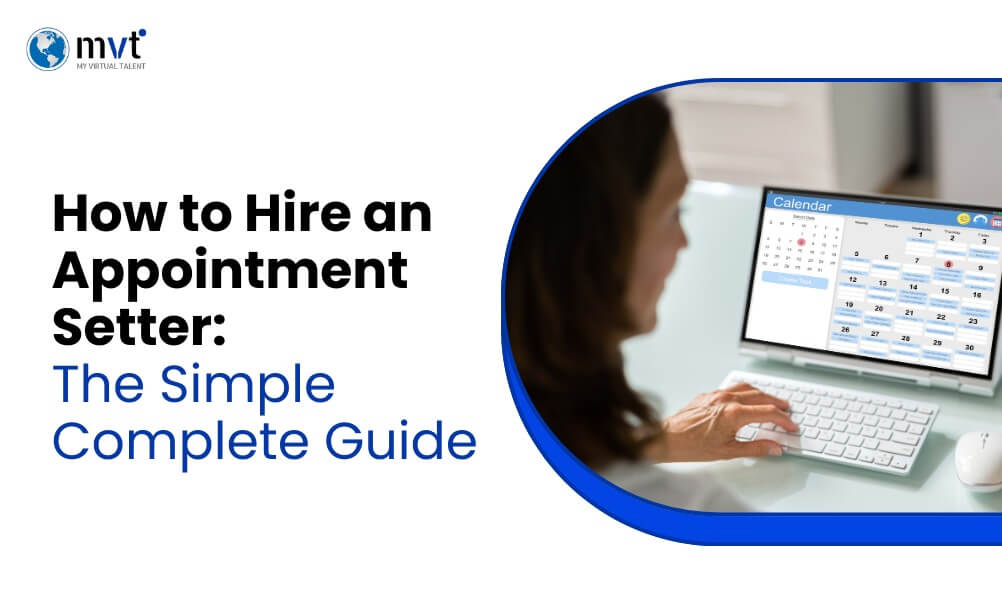
Picture this scenario: your marketing team generates 100 qualified leads this month, but your sales team only follows up with 52 of them. According to research, 48% of salespeople never follow up with a prospect, and each missed opportunity represents lost revenue that could have funded your next growth initiative.
This is where appointment setters become game-changers for your sales process. They serve as the crucial bridge between marketing-generated leads and closed deals, ensuring no potential customer falls through the cracks while your senior sales staff focuses on what they do best: closing deals.
The trend toward specialized appointment setting has accelerated dramatically. Companies across industries are discovering that outsourcing or dedicating resources to professional appointment setters can increase their sales productivity by up to 300%. Rather than having expensive account executives spend time on initial outreach and scheduling, smart businesses are building dedicated appointment setting functions that feed qualified prospects directly to their closers.
You will learn what appointment setters do, and why they’re essential for scaling your sales operation, where to find the best candidates, how to identify or evaluate their skills effectively, and the proven strategies for managing them successfully. By the end, you’ll have a complete roadmap for transforming your lead conversion process.
What is an Appointment Setter?
An appointment setter is a sales professional who specializes in the initial stages of the sales process, specifically qualifying leads and scheduling meetings between prospects and senior sales representatives. Unlike closers who focus on finalizing deals, or account managers who maintain existing customer relationships, appointment setters concentrate entirely on creating opportunities for your sales team.
Their core responsibilities include lead qualification through discovery calls, appointment scheduling using various tools and platforms, CRM management to maintain accurate prospect data, and consistent follow-up to nurture relationships until prospects are ready to meet with your sales team.
The distinction between inbound and outbound appointment setters is crucial to understand. Inbound appointment setters handle leads that have already expressed interest through marketing channels, website forms, content downloads, or direct inquiries. They focus on moving these warm leads through the qualification process quickly and efficiently.
Outbound appointment setters, on the other hand, engage in proactive prospecting. They research potential customers, make cold calls, send cold emails, and use various outreach strategies to generate new opportunities from scratch. This role requires higher resilience and more advanced prospecting skills.
A typical day for an appointment setter may include reviewing & prioritizing new leads in the CRM, making 50-80 qualification calls, sending personalized follow-up emails, updating prospect records with detailed notes, and coordinating with the sales team about upcoming appointments. They serve as the vital connection point that keeps your sales pipeline flowing consistently.
Why Your Business Needs an Appointment Setter
The most compelling reason to hire an appointment setter lies in the mathematics of sales productivity. When your senior sales representatives spend 40% of their time on prospecting and appointment setting, they have less time available for the high-value activities that actually generate revenue. By delegating initial outreach to specialized appointment setters, your closers can focus entirely on converting qualified prospects into paying customers.
Statistics demonstrate the dramatic impact this specialization can have. Companies that implement dedicated appointment setting see conversion rates improve by 25-40% because leads receive faster, more consistent follow-up. Additionally, sales teams with appointment setters typically increase their overall productivity by 200-300% since they can handle more qualified opportunities in the same timeframe.
From a cost perspective, hiring an appointment setter often proves far more economical than adding another senior sales executive. A skilled appointment setter might earn $35,000-$50,000 annually, while a senior sales representative commands $70,000-$120,000 plus commission. If one appointment setter can support 2-3 closers by keeping their calendars full of qualified prospects, the ROI becomes obvious.
Many business owners may mistakenly view appointment setting as “entry-level” work, but this perspective misses the mark entirely. Effective appointment setters possess sophisticated communication skills, deep understanding of sales psychology, & the ability to represent your company professionally during those vital first interactions with prospects. They’re not simply schedulers, they’re skilled professionals who determine which leads deserve your sales team’s attention.
Types of Appointment Setters: In-House vs. Outsourced
In-House Appointment Setters
Bringing an appointment setter on board as a full-time employee gives you the highest level of control. You can design their training program, monitor performance closely, and ensure they fully understand and live your company culture. Over time, in-house appointment setters build strong product knowledge and learn how to communicate your company’s unique value in a way that feels natural. They also benefit from constant feedback from your sales team, allowing them to adjust quickly and improve results.
However, hiring in-house is not just about paying a salary. The true cost is much higher. For example, a base salary of $45,000 per year often grows to $65,000–$70,000 once you include benefits, payroll taxes, management time, and the tools they need to succeed. This can include CRM software, call systems, and ongoing training resources.
An in-house appointment setter works best if you have a steady flow of leads to support them, or if your sales process is complex and requires detailed product knowledge. It is also a great option when your customers expect highly personalized outreach that reflects your company culture. In these cases, the investment in full-time hiring can be well worth it.
Outsourced Appointment Setting Services
A specialized agency can be a smart option when you need an appointment setter but don’t want to build an in-house team from scratch. These agencies already have the experience, systems, and training needed to get results quickly. Because they have worked across many industries, they know what works and can apply proven strategies to your business without a long setup period.
The cost of outsourcing can vary. Some agencies charge per appointment, usually between $75 and $200. Others use a monthly retainer model, which can range from $3,000 to $10,000. In some cases, agencies also work on revenue-sharing agreements. When reviewing providers, look closely at their track record, client retention, and the results they guarantee.
Outsourced appointment setters also bring other advantages. They let you scale up or down quickly, without worrying about hiring or training. They manage performance, use advanced tools, and often deliver higher productivity than a new in-house team. This reduces the management burden on your company while giving you reliable results.
By choosing the right agency, you can save time, lower risks, and focus on growing your core business while skilled appointment setters handle your lead pipeline.
Freelance Appointment Setters
A freelance appointment setter can be a great option for businesses that want flexibility or are just starting to test appointment setting. Freelancers are easy to find on platforms like Upwork, Freelancer, and sales-focused communities. Many of them already have experience and can start working with you almost right away. This makes freelancers a smart choice for short-term projects or when you need quick results without committing to a full-time hire.
One of the biggest benefits of working with freelancers is cost and flexibility. You can scale their hours up or down depending on your lead flow and budget. This allows you to manage costs more easily compared to in-house staff or agency retainers.
However, there are even challenges. As freelancers work independently, you need strong systems in place for communication and reporting. It’s vital to set clear performance goals, share scripts, & check results regularly. You also give up some control over training and cultural fit, freelancers may not fully collaborate with your team.
For many businesses, a freelance appointment setter is the right first step to test the waters before investing in a bigger in-house team or agency partnership.
Essential Skills to Look for in an Appointment Setter
Communication Skills
Strong communication skills are at the heart of being a successful appointment setter. When speaking on the phone, they need to sound confident, professional, and friendly. A good phone presence builds trust & makes prospects feel comfortable. Great appointment setters also listen carefully. By paying attention to what a prospect is saying, they can identify pain points and explain how your product or service can solve those problems.
Written communication is just as important. Many appointment-setting tasks involve sending emails, follow-ups, or LinkedIn messages. A skilled appointment setter knows how to write clear, personalized emails that don’t feel like generic templates. Their messages stand out in a crowded inbox while still matching your company’s brand voice.
Adaptability is another key skill. Different prospects require different approaches. A strong appointment setter can speak formally with executives, use casual language with small business owners, and hold technical conversations with IT staff. This ability to adjust communication style while staying authentic makes them highly effective in building connections.
In short, an appointment setter with excellent communication skills creates trust, sparks interest, and sets the stage for successful sales conversations.
Technical Proficiencies
In today’s world, a successful appointment setter must be comfortable using modern tools. One of the most important skills is knowing how to work with a CRM system such as Salesforce, HubSpot, or Pipedrive. A skilled appointment setter updates records correctly, tracks every conversation, and uses reports to measure performance. Without CRM knowledge, it’s hard to stay organized or keep sales teams informed.
Understanding sales funnels and lead qualification is also very valuable. A good appointment setter should know how to tell which leads are ready for immediate contact and which ones need more time. Concepts like lead scoring, buying stages, and qualification criteria help them make smarter decisions and save time for the sales team.
On top of that, knowledge of scheduling tools like Calendly or Acuity makes it easy to set up calls without confusion. Familiarity with email automation platforms helps in sending professional follow-ups, while basic sales analytics skills allow them to track results.
Overall, an appointment setter with strong technology skills works faster, makes fewer mistakes, and easily adapts as your sales process grows and changes.
Personality Traits
One of the most important qualities for an appointment setter is resilience. This job involves constant rejection, and only people with emotional strength can keep going without losing motivation. A resilient appointment setter sees rejection as part of the process, not a personal failure. When reviewing candidates, look for signs of persistence in their past, success in sales roles, sports, or other demanding areas often show they can handle pressure and keep pushing forward.
Still, persistence should never mean being overly aggressive. The best appointment setters know how to balance follow-up with respect. They contact prospects regularly, but also recognize when to pause or stop, ensuring that persistence never feels pushy.
Time management and organization are also key. Appointment setters often work with many leads at once. They must know how to prioritize calls, schedule follow-ups, and keep accurate records. This prevents missed opportunities and ensures prospects always feel valued.
In short, a successful appointment setter combines resilience, persistence, respect, and strong organization to stay effective and productive, even in the face of challenges.
Where to Find Quality Appointment Setters
There are many ways to find a skilled appointment setter, but your strategy is what makes the real difference. Traditional job boards like LinkedIn, Indeed, and ZipRecruiter are still effective, but try to avoid posting vague job ads. Rather than writing clear listings that describe your ideal candidate, daily responsibilities, performance expectations, and growth opportunities within your company.
Specialized sales recruitment agencies can also help. These agencies may keep a pool of pre-screened appointment setters who have proven success. While they may charge higher fees, they can save you time and connect you with quality candidates much faster.
Industry-specific communities and forums are another great option. An appointment setter with experience in your industry already understands customer pain points, objections, and the best messaging strategies, making them valuable from day one.
Don’t forget about the referrals. Offer bonuses to employees or industry contacts who recommend strong candidates. Even current appointment setters may know others looking for new opportunities.
Make use of social media recruiting. On LinkedIn, you can search for professionals with relevant experience, interact with their content, and reach out directly with personalized messages about your open role.
The Interview Process: Questions That Matter
Screening Questions
When hiring an appointment setter, start with questions that uncover their experience and qualifications. Ask if they have worked in your industry or with similar markets, and find out how comfortable they are with cold calling, handling objections, and following sales targets. Their answers will give you a clear idea of how ready they are for the role.
Useful screening questions include:
- “Describe your experience with lead qualification. What criteria do you use to decide if a prospect is worth pursuing?”
- “Walk me through your daily routine in your last appointment setter job.”
These simple questions help you understand skills, work habits, and how well they fit your sales process.
Practical Assessments
A great way to test an appointment setter is through role-playing exercises. Give candidates common situations like handling a skeptical prospect, speaking with a gatekeeper, or answering simple product questions. Watch how they communicate, solve problems, and stay calm under pressure.
You can also ask for sample call recordings from past jobs or have them do a live call during the interview. This shows their true phone presence and how well they think on the spot.
Written communication matters too. Ask them to write a follow-up email for a prospect. Pay attention to how personal, professional, and clear their message is, and whether it includes a strong call to action.
Cultural Fit Evaluation
Beyond technical skills, assess how well candidates align with your company values and sales philosophy. Do they demonstrate genuine curiosity about your business? Are they asking thoughtful questions about your sales process and target market?
Evaluate their ability to work independently since appointment setters often operate with minimal direct supervision. Ask about their preferred communication styles, feedback preferences, and how they stay motivated during challenging periods.
Understanding their long-term career goals helps predict retention and identifies candidates who view appointment setting as a valuable stepping stone rather than a temporary position. Look for professionals who see opportunity for growth within your organization.
Setting Up Your Appointment Setter for Success
Onboarding and Training
Comprehensive product knowledge forms the foundation of effective appointment setting. Your new hire must understand your solution’s key benefits, common use cases, and competitive advantages well enough to answer basic questions and position your offering appropriately during initial conversations.
CRM training should cover not just technical functionality but also your specific data management protocols, lead qualification criteria, and reporting requirements. Establish clear expectations about record-keeping, follow-up timing, and communication standards.
Develop call scripts and objection handling techniques, but train appointment setters to use them as guides rather than rigid scripts. The best appointment setters sound natural and conversational while hitting key talking points that move prospects toward scheduling meetings.
Ongoing coaching and development programs ensure continuous improvement. Schedule weekly one-on-one meetings to review performance, role-play challenging scenarios, and provide feedback on recent calls or emails. Consider pairing new appointment setters with experienced team members for mentoring relationships.
Tools and Technology
An appointment setter needs the right tools to work efficiently. A strong technology stack usually includes a CRM system, email automation software, scheduling platforms, and easy-to-use communication tools. These systems should connect smoothly with your existing processes so the workflow stays simple and productive.
When marketing automation and CRM tools are linked, appointment setters get helpful background details about prospects. This context shows them past interactions and makes it easier to start conversations that feel more personal and relevant.
Call recording and monitoring tools are also important. By reviewing calls regularly, you can spot areas for improvement and highlight techniques that work well. This improves training and helps your entire team perform better.
Performance Metrics and KPIs
Clear goals help an appointment setter know exactly what success means in your company. Common performance metrics include daily call volume, how many appointments they set, how many prospects actually show up, and how many of those meetings turn into sales.
Targets should be realistic. For example, a new appointment setter may only book 2–3 qualified appointments per day. With more experience, that number can rise to 5–8 daily. These benchmarks depend on your industry and sales process.
Performance reviews should look at both numbers and quality. It’s not just about how many appointments are set, but also whether the leads are strong, relevant, and provide value to your sales team. Prospect feedback is also useful for improvement.
Managing and Motivating Your Appointment Setter
Effective compensation structures balance base salary security with performance incentives. Many companies use a combination approach, providing enough base salary to ensure financial stability while offering bonuses or commissions tied to appointments set or ultimate deal closure.
Recognition programs acknowledge excellent performance and create positive team culture. This might include monthly performance awards, public recognition for achieving targets, or opportunities to participate in advanced training programs.
Career advancement opportunities help retain top performers who might otherwise seek growth elsewhere. Look for promoting successful appointment setters to senior sales roles, team leadership positions, or specialized areas like key account development.
Address performance issues quickly and directly. Poor performance often stems from inadequate training, unclear expectations, or misalignment between role requirements and individual strengths. Regular coaching conversations help identify and resolve these issues before they become critical problems.
Common Mistakes to Avoid When Hiring
Many businesses focus exclusively on cost when evaluating appointment setting options, choosing the cheapest provider without considering quality or results. This approach often backfires when low-cost providers deliver poor-quality leads that waste your sales team’s time or damage your brand reputation.
Inadequate training and support systems set appointment setters up for failure. Without proper product knowledge, clear processes, and ongoing coaching, even talented individuals struggle to achieve their potential in your specific environment.
Setting unrealistic expectations or quotas creates frustration and high turnover. Research industry benchmarks, consider your lead quality and market conditions, and establish targets that challenge appointment setters while remaining achievable.
Poor communication between appointment setters and sales teams leads to misaligned expectations and frustrated prospects. Implement regular feedback loops where closers provide input about lead quality and appointment setters understand which prospects are most likely to convert.
Neglecting to track and analyze performance data makes it impossible to optimize your appointment setting function over time. Implement robust reporting systems and conduct regular analysis to identify trends, opportunities, and areas needing improvement.
Measuring Success: ROI of Your Appointment Setter
Calculate cost per appointment by dividing total appointment setting costs by the number of qualified appointments scheduled. This metric helps you understand the efficiency of your investment and compare different appointment setting approaches.
Track cost per closed deal to understand the ultimate ROI of your appointment setting function. While appointment setters don’t directly close deals, their contribution to deal flow makes this a valuable measurement of their overall impact on revenue generation.
Monitor improvements in sales team productivity by comparing close rates and revenue per representative before and after implementing dedicated appointment setting. Significant productivity increases validate the investment and justify expansion.
Evaluate lead quality improvements through feedback from your sales team and analysis of conversion rates from appointment to closed deal. Higher-quality appointments should convert at better rates and require less time from your closing team.
Consider the long-term impact on revenue growth and customer acquisition. Effective appointment setting should accelerate your sales pipeline, reduce customer acquisition costs, and enable faster business scaling.
Transform Your Sales Process Today
Hiring a skilled appointment setter is one of the smartest investments for any sales team. It’s not just about booking more meetings; it’s about building a clear, reliable system for turning leads into opportunities. With the right appointment setter, your sales staff can focus on closing deals while knowing no good prospect is left behind.
To succeed, you need more than the right hire. Training, clear expectations, proper tools, and ongoing management are all part of the process. Whether you hire in-house, use an agency, or work with freelancers, the core principle stays the same: skilled professionals, supported with the right systems, will deliver results. Ready to find your next appointment setter? Consult MyVirtualTalent today.
Looking for fresh content?
Get articles and insights from our weekly newsletter.
Recent Posts
Reduce Your Marketing Spend By 70% And Grow Your Revenue Organically 10X Faster!
Get a Free Quote Today!










